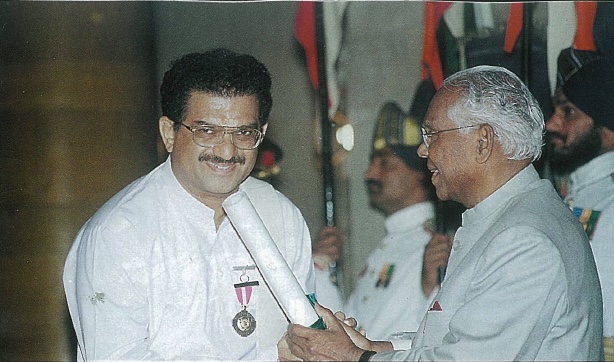By Vrindavanam S. Gopalakrishnan
At least 30 people men, women and children sit waiting in the lobby for an audience with the Heggade, the chieftain or leader. Clad in snow-white dhoti and shawl, Dr. Veerendra enters the hall and sits in a chair. Everyone rises, moves towards him and sits before him. One by one, they present their problems. He listens patiently and then sends them off. After careful consideration, he delivers the verdict.
Dr. Veerendra, a Jain, is the guardian of the Sri Manjunatheswara Temple located in northwestern Kerala, 44 miles from Mangalore. He acts as the local judge, a custom followed for over 800 years. His decisions are accepted as law and honored by the civil courts of the country. “So great is the belief of the people in Lord Manjunatha,” he said, “that they invoke His name when they reach the end of their tether to find a solution to a dispute without remedy. The strange thing about this practice is that it is adopted by people of all faiths.” It is the local custom that once the Lord’s name had been uttered by the injured party, both parties cease talking to each other until they appear before the Heggade, Dr. Veerendra.
The Dharmasthala, as the temple complex is called, is also active with many social service programs, all led by Dr. Veerendra. Last year he received from President of India K.R. Narayanan the prestigious Padmabhushan award in honor of his extraordinary service to the needy and poor. Five days a week, 3,000 guests are served free, high-quality meals. The Dharmasthala also helps the people by distributing clothing, giving financial assistance, arranging mass weddings for the poor, running hospitals and 40 schools from primary to college. One of the latest successes was rehabilitation of 1,800 alchoholics, mainly because they were inspired to practice daily bhajans, religious singing, at the temple, said Dr. Veerendra. The temple spends around us$2.2 million annually.
The priests of this Siva temple are Vaishnavite brahmins, according to temple manager Mr. Ramakrishna Uduppa, also a Jain by faith. “Thus, it is a confluence of faiths that harmonizes in belief of the Omnipotent,” he says. “As one of the oldest civilizations, our ancestors have erected magnificent temples, living records of our history, culture and religion which act as the focal point for uniting a community. Unfortunately for us, many temples are in ruin.”
“Our temples are a part of our heritage that we cannot afford to lose,” said Dr. Veerendra. “Together we can and must revive them to their former glory for posterity, and make them the nerve center of throbbing human activity once again.” Since 1991, he has been able to bring back 21 ancient temples to their original grandure. The renovations closely follow the lines of the original structure with every effort to ensure that the detail and architectural style is retained.
Sri Dharmasthala Manjunadheswara Trust, Dharmasthala, P.O., South Canara, Karnataka, India


